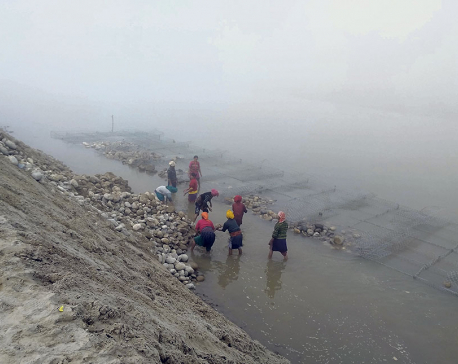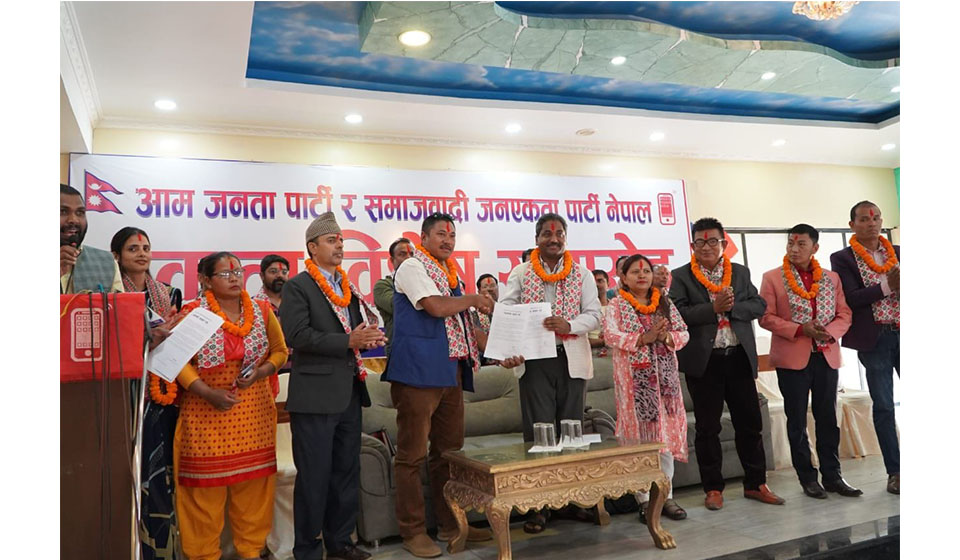
OR
Govt brings bill to coordinate federal tiers
Published On: April 20, 2019 05:25 AM NPT By: Ashok Dahal | @ashokpillar
KATHMANDU, April 20: The government is introducing a new law to coordinate the provincial and local units with the federal level while exercising concurrent powers, and to settle disputes between the three tiers of government under the federal structure.
The Prime Minister's Office (PMO) registered the bill on coordination between the center, the provinces and the local levels at the secretariat of the National Assembly on Thursday.
The bill has proposed a National Coordination Council (NCC) for coordination in law making, power sharing and other issues between the three tiers of government.
Similarly, an Inter-Province Council is proposed as a dispute settling mechanism among and between the provinces and the federal government . The provincial assemblies will be assigned to settle disputes between and among the provinces and local units.
The NCC is proposed to be constituted under the leadership of the prime minister and will include federal ministers, chief ministers and representatives from the local units for coordination with the provincial and local levels.
The ministers for finance, law, home and federal affairs from the center , the chief ministers of all seven provinces, the vice chairperson of the National Planning Commission and seven representatives including two women from the local units will be members of the council. The NCC will be the first national-level body with local level representatives.
The bill has stated that representation from the umbrella organizations National Association of Rural Municipalities in Nepal, Municipal Association of Nepal and Association of District Coordination Committees of Nepal will be ensured on the NCC.
Besides coordinating between the local, provincial and federal tiers of government the NCC will be responsible for fixing basic standards for education, health and employment and will offer suggestions to the three tiers on law drafting and implementation, reads the bill. Meetings of the council will be summoned at least twice a year by the prime minister and a secretariat is proposed at the Prime Minister's Office for coordination among the three tiers.
According to Minister for Law, Justice and Parliamentary Affairs Bhanu Bhakta Dhakal, the bill was drafted with a view to foster coordination with the provinces and local governments as envisioned by Article 235 of the constitution.
The bill has proposed that a provincial coordination council be formed for coordination between provinces and local levels. It has also provisioned that local units should abide by the decisions of the provincial coordination council and the provincial coordination council should follow the decisions and directions from the NCC.
The bill has tasked the Inter-Province Council (IPC) with resolving political disputes between the center and provinces and among the provinces. The prime minister-led IPC includes federal ministers and the chief ministers of the seven provinces.
The IPC shall intervene if any decision or activities of the provincial bodies breach the jurisdiction of the federal government or any decision of the federal government overrides the powers of the province.
So far there is no specific law on the responsibility and jurisdiction of the Inter-Province Council. The bill has proposed that complaints shall be filed at the secretariat of the IPC within 15 days of any dispute and the dispute should be settled within three months through dialogue, consensus and consultations.
According to the bill, the federal government or provinces concerned should implement the decision of the IPC on any dispute among or between the provinces and the center. This is an apparent move to implement the 29-point resolution reached during the first IPC meeting last year.
The bill has tasked the provincial assembly with settling political disputes between the provinces and local units. Local units or provinces should file a complaint with the provincial assembly speaker about a dispute within 15 days and the provincial assembly should settle the dispute within three months of the complaint.
At a time when the provincial governments are complaining that the local governments are outside their control the bill has proposed that the provincial cabinet can issue necessary directions to the municipal executives for coordination between and among local units and provinces.
The bill has stated that the federal government shall direct the local governments directly or through the provincial governments to carry out activities in line with the constitution and existing laws.
The government has proposed that the federal government will formulate necessary laws on concurrent powers as per Schedules Seven and Nine of the constitution . The provincial and local units shall draft laws on common powers on the basis of federal law.
The constitutional bench will be the place of last resort for settling political disputes between the federal, provincial and local governments.
You May Like This

Resolve Embankment Issue Diplomatically
The unilateral construction of an embankment by the Indian side along the Mahakali River in Darchula district has triggered protests... Read More...

Five local units of Saptari may lose federal grant
RAJBIRAJ, Aug 28: Five rural municipalities of Saptari district are likely to lose federal grants after failing to hold their respective... Read More...

Disputes on land passed by the 'people's government' surface again
DANG/RUKUM, Jan 10: Eleven years ago, Mohan KC of Rukum, Banfikot purchased eight ropanis of land from another local Tirtharaj... Read More...




Just In
- Sunkoshi-Marin Diversion Project’s tunnel construction nears completion, breakthrough scheduled for May 8
- Govt tightens security arrangement for Third Investment Summit 2024
- Pesticide residue found in vegetables in Nepalgunj
- Aam Janata Party and Samajwadi Jana Ekata Party merge
- 1,600 participants confirmed for Nepal Investment Summit
- Ilam-2 by-elections held peacefully, vote count likely to start tonight
- NEA schedules five-day power cut across Kathmandu Valley for underground cable installation
- Hundreds of passengers including foreign tourists in distress as poor visibility halts flights to and from PRIA







-1200x560-wm_20240427144118.jpg)





Leave A Comment